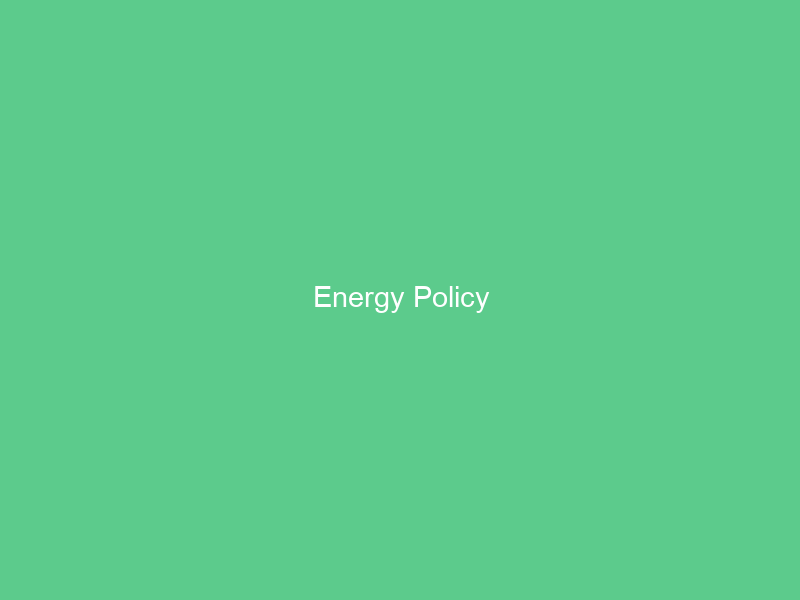Energy policy encompasses strategies that support renewable energy sources and efficiency measures, regulate energy markets, set carbon pricing policies and offer incentives. Furthermore, energy policies promote research and development of new energy technologies.
Oil drilling, coal mining, and renewable energy production all carry environmental costs that must be balanced against. Energy policy should provide for sustainable resource development while simultaneously protecting iconic landscapes with expanded protections; cleaning up sites where necessary; and setting forth clear mitigation and reclamation requirements.
Cleaner Energy Economy
From an environmental perspective, producing clean energy emits significantly fewer harmful pollutants than fossil fuel-based energy production processes, helping to limit greenhouse gas emissions and improve air quality. Furthermore, from an economic standpoint the production of clean energy creates new job opportunities while contributing to economic development.
Policymakers can also implement policies to facilitate the growth of a clean energy economy through setting energy efficiency standards for buildings and appliances, creating carbon pricing mechanisms like taxes or cap-and-trade systems, or offering incentives such as tax credits for homeowners who install solar panels. Such policies help lower equipment costs, attract businesses investing in cleaner technologies more easily, and promote widespread deployment.
As a result of these and other efforts, many countries are making rapid strides towards becoming cleaner energy economies than had been anticipated by forecasters. For instance, private investments in clean energy manufacturing are increasing twice as fast as investments in other types of manufacturing; and investments in electric vehicles and batteries have more than doubled by 2023.
Reliable Power Supply
Energy policy encompasses an expansive set of issues, from encouraging renewable energy production to expanding interconnected networks. Furthermore, it may include policies designed to regulate energy markets, decrease carbon emissions, encourage the use of efficient technologies and provide subsidies and incentives.
Power supplies are an example of where energy efficiency has an immediate effect on reliability, as using components with higher inherent durability (due to their design or physical makeup), derating, and thermal considerations with adequate cooling can reduce failure rates significantly. Minimizing temperature rises through use or environment can have the same beneficial results, while quality, conservative design and adequate margins all can lead to products with increased reliability and decreased chances of failure – increasing uptime while lowering overall ownership costs and risking equipment damage. This is particularly vital when applied in data center or server applications where uptime is crucial.
Affordable Energy
Access to affordable, reliable and clean energy provides the foundation of prosperity, development and social justice. Families rely on energy for cooking and heating purposes; children need lighting so that they can do homework after dark; communities rely on energy for economic development and connectivity.
Energy affordability can depend on a number of factors, including fuel costs, infrastructure maintenance and upgrades, regulatory fees and market dynamics. Low-income households may find these costs prohibitively costly to the point that they struggle to afford basic household needs like food and healthcare services.
Sustainable Development Goal 7 (Affordable and Clean Energy) offers solutions to this challenge while simultaneously supporting environmental sustainability and economic resilience. Examples of policies supporting SDG 7 include investing in renewable energy sources, developing energy-efficient technologies and implementing carbon pricing. However, each strategy involves tradeoffs and interconnections that need careful consideration; which demonstrates why energy policy is such a complex issue requiring participation by many stakeholders and the negotiation of competing priorities.
Reduced Carbon Emissions
Energy policies can play a key role in helping reduce carbon emissions by encouraging cleaner energy technologies like solar and wind, or by taxing or cap-and-trade programs like the European Union Emissions Trading System, which set limits on emissions while permitting companies to buy or sell emission allowances.
States and regions are playing an essential role in combatting climate change without strong federal action, developing innovative solutions, delivering near-term emission reductions and setting the groundwork for further action. Their efforts may accelerate the shift towards cleaner energy alternatives.
Energy policymakers must strike a delicate balance among competing priorities, such as economic growth, energy affordability and security, environmental sustainability and social equity. Furthermore, they must consider how their choices will play out on a global energy marketplace and align with international agreements on climate change; additionally they should assess their decisions’ repercussions across different sectors and individuals.

